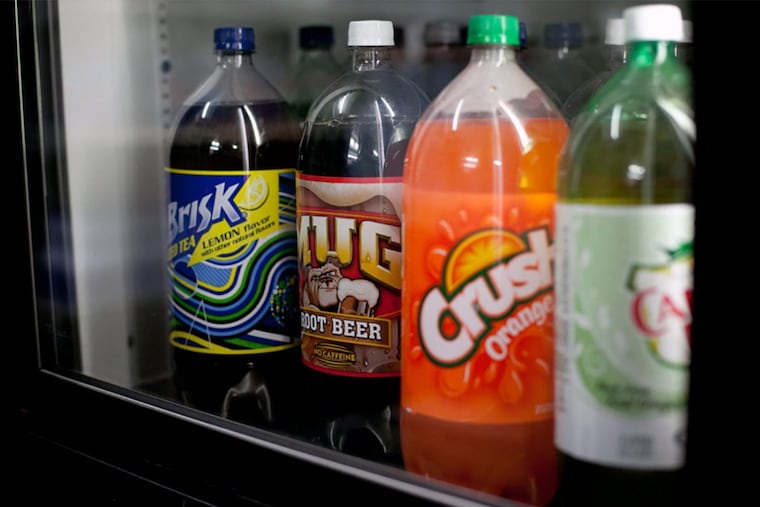Beverage tax might be Philly's biggest win of all | Opinion
Drexel researchers found that since the tax took effect on January 1, 2017, the number of daily drinkers of sodas and energy drinks dropped by 40 percent and 64 percent, respectively, compared to areas outside the city.

A grandmother sat waiting with her 8-year-old granddaughter for the girl's annual check-up. "I keep telling her to wash her neck, but she never does it," she said as soon as I walked into the room, clearly embarrassed.
The dark, slightly thickened areas on the sides of her granddaughter's neck told a different, more worrisome story. Acanthosis nigricans, often mistaken for dirt on the neck and under the arms, except that it doesn't wash off no matter how much you scrub, is an early sign of impending diabetes. Seeing it in this 8-year-old meant this young girl was already well on the road to developing diabetes, a condition that a generation ago was thought of as a disease of the elderly.
This story plays out daily across Philadelphia, as poor diets and lack of physical activity drive rates of chronic disease sky-high. We are the unhealthiest big city in America, and ranked the unhealthiest county in Pennsylvania. High rates of smoking, obesity, lack of exercise, and consumption of unhealthy food drive these numbers, along with our high rate of poverty, particularly childhood poverty. And our high rates of disease also drive up our poverty rate in an ugly cycle, as heart attacks, strokes, and kidney failure limit people's ability to work and support their families.
Yet, Philly has begun to feel like a city of endless possibilities, thanks in no small part to the recent spate of championship parades and playoff games. And a Drexel University study released in April may reveal the biggest win of all.
The study is the first to look at what residents are actually drinking after implementation of the Philadelphia beverage tax. In other words, it studies the same daily soda habit that brought my young patient to the brink of diabetes.
>> READ MORE: Pa. Supreme Court hears arguments on Philly soda tax
The Drexel researchers found that since the tax took effect on Jan. 1, 2017, the number of daily drinkers of sodas and energy drinks dropped by 40 percent and 64 percent, respectively, compared with areas outside the city. As important — daily bottled water consumption has gone up by 58 percent. That is, the people who were most hooked on sodas and energy drinks, the daily drinkers, appear to be switching to bottled water.
There are some caveats: The sample size was small, about 900 people, and looked only at the first two months of the tax. But these data suggest Philadelphians may really be changing their habits. That could mean real change in our dismal bottom-of-the-pack health outcomes.
And who knows, maybe the multi-million dollar PR campaign the beverage industry has been running against the tax has actually helped drive that change. After all, those of us who care about health could never afford to put signs in every corner store and every grocery store deriding the tax. So thanks, American Beverage Association! You may have just saved a lot of lives.
April also saw the city's release of data on unemployment and wage tax revenues since implementation of the beverage tax. Unemployment actually fell in the sectors of our economy we would expect to be affected by the beverage tax. And wage tax revenues in those sectors have risen since the beverage tax started. Those are irrefutable facts that throw cold bottled water on the soda industry's claim that this tax is a job killer.
The beverage tax wasn't passed to change health. That's just a side benefit. The dollars raised by the tax will help refurbish our parks and recreation centers, helping to create spaces where we can come together to play with our children, strengthen our bodies, and rejuvenate our souls. And when green spaces are kept up and people come together in neighborhood parks, violence falls.
By paying for high-quality pre-K and community schools, those dollars will also support our children's academic futures, using strategies that have been shown to boost test scores, high school graduation rates, and long-term economic success.
>> READ MORE: Soda tax passes; Philadelphia is first big city in nation to enact one
So, imagine – as I do — the Philadelphia of the future, a city where incomes are rising, where residents are no longer held back by spiraling rates of chronic disease, a city whose green spaces flourish, attracting thousands of people to walk, run, and play, and a city that has chosen to put its money into building the health of its children, instead of into the pockets of soda industry executives.
And when the day comes that Philly wins the Super Bowl of health, and we hit No. 1 on the health-by-county rankings list, we're going to have ourselves a parade.
Cheryl Bettigole, M.D., M.P.H., is director of the Division of Chronic Disease Prevention of Get Healthy Philly, an initiative of the Philadelphia Department of Public Health.